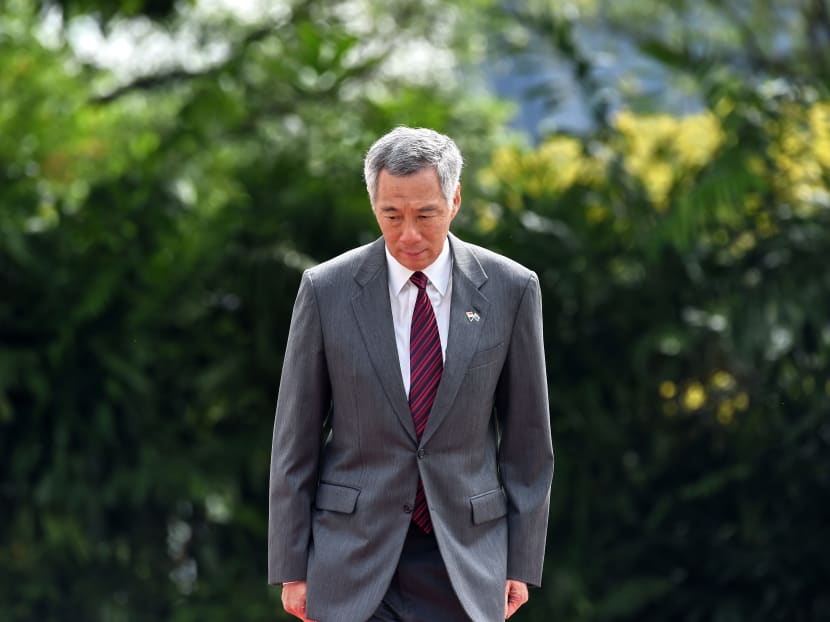Chinese state media, netizens seize on Lee family dispute to criticise Singapore
SINGAPORE — Chinese state media and netizens have seized on the feud between Prime Minister Lee Hsien Loong and his siblings to criticise the Republic’s leadership, drawing a sharp contrast between their coverage and that of the media in countries around the world, which have mostly stuck to factual and balanced reporting.

This photograph taken on June 2, 2017 shows Prime Minister Lee Hsien Loong at an event at the Istana presidential palace in Singapore. A feud between the children of Singapore's late founding leader intensified on June 14, 2017 after two siblings publicly accused their brother PM Lee of disobeying their father's last wishes and abusing his powers. Photo: AFP
SINGAPORE — Chinese state media and netizens have seized on the feud between Prime Minister Lee Hsien Loong and his siblings to criticise the Republic’s leadership, drawing a sharp contrast between their coverage and that of the media in countries around the world, which have mostly stuck to factual and balanced reporting.
On Thursday (June 15), for example, the Global Times ran an opinion piece headlined “Is family feud indicating a broader dispute in Singapore?” In adopting a hectoring tone, the piece posited that the family dispute was a sign that socio-political tensions were brewing in Singapore.
“The attack launched on Lee Hsien Loong by his two siblings to some extent represents the dissatisfactions of the liberals and opposition parties against the ‘central interest group’ built up by Lee Hsien Loong, which may lead to the outburst of conflicts in Singapore,” the commentary said.
It went on to say that “Singapore appears to be ill-prepared to adapt to global changes. Its avid support of the South China Sea arbitration rendered the country isolated. As an active promoter of the Trans-Pacific Partnership, it was caught in an awkward position after US President Donald Trump discarded the deal. These have cornered Singapore into an unprecedented passive diplomatic position”.
It concluded thus: “Lee Hsien Loong has been granted a chance on the stage of history, but is being rooted against by his siblings. His winning edge lies only in his governance achievements.”
The tabloid, which is published by the Chinese Communist Party’s mouthpiece, People’s Daily, and thus offers a view of official thinking, has long had Singapore in its sights.
Last November, after the Singapore Armed Forces’ Terrex vehicles were seized, it warned that the Republic’s “hypocrisy” over its military relationship with Taiwan could harm its relations with China.
A month earlier, it published a series of reports critical of PM Lee’s official visit to Japan. The newspaper claimed that Singapore had agreed to cooperate with Tokyo on various issues, including territorial disputes in the South China Sea.
That charge came after it alleged in September that Singapore had pushed for a stronger statement on an international tribunal ruling invalidating Beijing’s expansive claims in the South China Sea during the Non-Aligned Movement summit. Singapore’s ambassador to China, Stanley Loh, rebutted the report, calling it “false and unfounded”, but the paper stood by its story.
Global Times’ readership comprises a sizeable number of young nationalists.
Those voices were very much in evidence on Weibo, China’s version of Twitter, after reports of the dispute between the Lees were published.
The tone of the reactions bordered on the belligerent. One netizen, for example, wrote: “The Lee family is the vanguard of anti-China (forces). But if you want to oppose China, you should first get your family matters in order.”
Said another: “Lee Hsien Loong did not go against the wishes of Lee Kuan Yew, because both father and son chose to be lackeys of America”.
Hongkong’s South China Morning Post, meanwhile, reported that after reports of the dispute were published by outlets such as Xinhua and People’s Daily, many Chinese nationals took the opportunity to gloat.
One such report, in the Global Times, was flooded with over 5,600 comments from netizens, with the top one attracting 1,440 likes, the Post reported.
That comment called Mr Lee “an anti-China lackey of the United States”. The poster revelled in details of the family split, and added: “Chinese people should forever remember this anti-China lackey of the West. He is more anti-China than anyone else.”
The tone in China contrasts sharply with that elsewhere.
Headlines in news outlets such as the Financial Times, Guardian, BBC News, CNN, and The New York Times were mostly spober recountings of details of the dispute.
The NYT’s headline, for example, was “In Singapore, Prime Minister’s sibligs are taking a private feud public”. The Financial Times’ story, headlined “Singapore frets over worsening Lee family feud”, noted that “the row has dominated political discourse in the Asian financial centre this week.”
Closer to home, Malaysian newspapers have also adopted a sober tone.
On Thursday, a day after the news broke, the New Straits Times carried a Reuters report which focused on the Lee siblings’ claim that they had “lost confidence” in the Prime Minister’s leadership. The Star, meanwhile, zoomed in on the accusation by Mr Lee Hsien Yang and Dr Lee Wei Ling that the PM was milking their father’s legacy. AGENCIES









